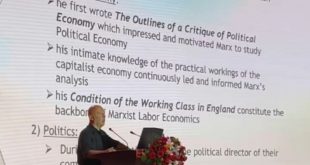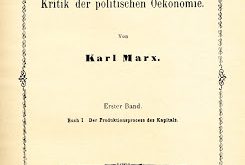[unable to retrieve full-text content]Michael Hudson discusses the evolving disconnect between modern economics and practical economic realities, using the example of American capitalism and its global influence. He critiques the shift towards finance capitalism and deregulation, comparing it to Thatcher-era England’s libertarian model, which minimized state intervention in the economy. This trajectory, according to Hudson, has led to a situation where government influence is overridden...
Read More »Der Gefesselte Marx
by Tom Walker Econospeak Book proposal: Marx’s Fetters and the Realm of Freedom: a remedial reading — part 2.1 Karl Marx’s preface to A Contribution to the Critique of Political Economy contains the best-known description of his theory of history. At some point contradiction between the relations of production and the forces of production become fetters on the latter, ushering in a period of social revolution. The traditional interpretation...
Read More »Ambivalence
by Tom Walker Econospeak Book proposal: Marx’s Fetters and the Realm of Freedom: a remedial reading — part 2.2 Published in 1821, The Source and Remedy of the National Difficulties was a major influence on Marx’s analysis of ‘disposable time.’ In an 1851 notebook, Marx logged a 1000 word summary of the pamphlet. He also discussed it extensively in volume 3 of Theories of Surplus Value. His discussion of disposable time in a section of...
Read More »Book proposal: Marx’s Fetters and the Realm of Freedom: a remedial reading. The Revolutionary Class
by Tom Walker Econospeak Book proposal: Marx’s Fetters and the Realm of Freedom: a remedial reading — part 2.7 The revolutionary class “The working class is either revolutionary or it is nothing,” Marx wrote to German politician J.B. von Schweitzer and copied “word for word” in a letter to Engels. In The Manifesto of the Communist Party, Marx and Engels wrote “the proletariat alone is a really revolutionary class.” Marx cited that...
Read More »The return of disposable time: time filled with the presence of the now
Book proposal: Marx’s Fetters and the Realm of Freedom: a remedial reading — part 2.9 by Tom Walker Econospeak Framing the revolution as being about disposable time brings Marx closer to Walter Benjamin’s remark about revolution being “the act by which the human race traveling in the train applies the emergency brake.” Benjamin’s “On the concept of history” was composed in the wake of Benjamin’s despair at the Hitler-Stalin pact that sealed...
Read More »Once Again on the Alleged Differences between Marx and Engels – S.Mavroudeas 2023 WAPE Forum
Frederick Engels: The First Marxist?[embedded content] The 2023 World Association of Political Economy (WAPE) Forum took place in Pingtan city (Fudgian province, China). In this forum I presented a paper titled ‘Once Again On The Alledged Differences Between Marx and Engels’. The paper confronts the attacks by many older and newer anti-Engelsionists (prominent among them M.Heinrich and D.Harvey) against Engels and it refutes their allegations that (a) Engels has falsified Marx’s...
Read More »Beyond vulgar heterodox economics: a note on the legacy of Pierangelo Garegnani (1930-2011)
My paper, in Italian, which was a modified version of a talk last year, has been published in Moneta e Credito, and is available for download here.
Read More »Marx’s “most realistic… most amazing insight!”
Marx’s “most realistic… most amazing insight!” In his farewell lecture at Brandeis University, “Obsolescence of Socialism,” Herbert Marcuse quoted a passage from the Grundrisse and claimed that in Capital, Marx had “repressed this vision, which now appears as his most realistic, his most amazing insight!” As large-scale industry advances, the creation of real wealth depends increasingly less on the labor time and the quantity of labor expended...
Read More »On the origins of Sraffa’s equations
Giancarlo de Vivo suggests that the Sraffian equations come from Marx's schemes of reproduction, and that the inspiration was in a footnote from the editor, Karl Kautsky, in the Theories of Suplus Value. Here a letter from Maurice Dobb and Piero Sraffa to Kautsky, from 1929, asking to use his edition as the basis for an English translation (originals in Kautsky's archives):De Vivo's views are discussed in a book edited by Massimo Pivetti, which is certainly worth reading (I have the Spanish...
Read More »Socially Ambivalent Labour Time VII: Capital volume 1, chapters one and three
EconoSpeak: Socially Ambivalent Labour Time VII: Capital volume 1, chapters one and three. Sandwichman, July 30, 2021 Afterword to the Second German Edition [of Das Kapital, Buch 1] (1873): I must start by informing the readers of the first edition about the alterations made in the second edition. One is struck at once by the clearer arrangement of the book. Additional notes are everywhere marked as notes to the second edition. The following...
Read More » Heterodox
Heterodox


